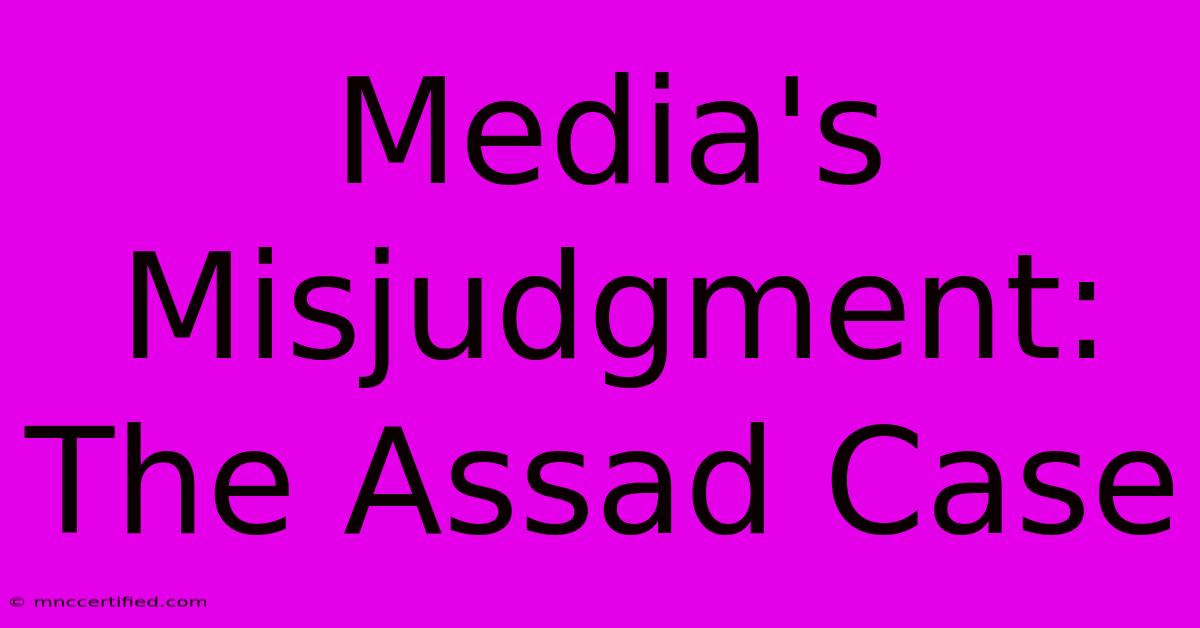Media's Misjudgment: The Assad Case

Table of Contents
Media's Misjudgment: The Assad Case – A Critical Analysis
The Syrian Civil War, a brutal conflict that has raged for over a decade, has been heavily documented by international media. However, the portrayal of Bashar al-Assad, the Syrian president, has been far from consistent, often characterized by misjudgments and a lack of nuanced understanding. This article critically examines the media's portrayal of Assad, exploring the reasons behind its inconsistencies and the consequences of these misrepresentations.
The Early Narrative: A "Reformer" Turned "Dictator"
Initially, some Western media outlets presented Assad as a potential reformer, a younger, more modern leader who could usher in a new era for Syria. This narrative, however, quickly crumbled as the protests of the Arab Spring evolved into a full-blown civil war. The Assad regime's violent crackdown on dissent, its alleged use of chemical weapons, and the ensuing humanitarian crisis led to a shift in media coverage. Assad was now painted as a ruthless dictator, responsible for the deaths of hundreds of thousands of Syrians.
This rapid shift, while arguably reflecting the reality on the ground, also highlights a critical flaw in early media reporting: a reliance on simplistic narratives and a lack of deep contextual understanding. The complexities of Syrian society, the intricate web of political alliances, and the historical context of the conflict were often overlooked in favor of a more easily digestible "good versus evil" storyline.
The Role of Confirmation Bias
The media’s portrayal of Assad was also influenced by confirmation bias. Once the narrative of Assad as a dictator solidified, evidence that contradicted this narrative was often downplayed or ignored. This selective reporting further solidified the existing image in the public mind, making it difficult to challenge the dominant narrative.
The Information War and Propaganda
The Syrian Civil War became a battleground not only for military forces but also for information warfare. Both the Assad regime and various opposition groups employed sophisticated propaganda techniques to shape international perceptions of the conflict. Discerning truth from falsehood became an increasingly difficult task for journalists operating in a hostile and highly volatile environment. The spread of misinformation and disinformation further complicated the media's attempt to present an accurate and unbiased account of events.
The Challenge of Access and Verification
Gaining access to information within Syria has always been challenging. Journalists faced significant risks, including arrest, detention, and even death. This limited access often resulted in a reliance on secondary sources, further contributing to the skewed and incomplete narratives that emerged. The difficulties in verifying information on the ground exacerbated this problem. The lack of independent verification mechanisms led to the proliferation of unconfirmed reports and unsubstantiated claims, making it difficult for the media to provide a reliable picture of the situation.
The Consequences of Misjudgment
The media's misjudgment of the Assad case has had significant consequences. It has contributed to a polarized public opinion, hindering efforts towards a peaceful resolution to the conflict. The oversimplification of the conflict, focusing solely on Assad’s alleged brutality without fully considering the complexities of the situation, has prevented a more thorough understanding of the root causes of the war and the diverse actors involved.
The Need for Nuance and Critical Analysis
Moving forward, it is crucial for the media to adopt a more nuanced and critical approach to reporting on the Syrian conflict and the role of Bashar al-Assad. This requires a commitment to rigorous fact-checking, a willingness to challenge preconceived notions, and an understanding of the historical, political, and social context of the conflict. The media must strive to provide a more complete and balanced picture, recognizing the limitations of its access and acknowledging the influence of biases and propaganda. Only then can the public hope to gain a clearer understanding of this complex and devastating conflict.
Keywords: Bashar al-Assad, Syrian Civil War, Media Bias, Propaganda, Information Warfare, Confirmation Bias, Misinformation, Disinformation, Middle East Conflict, Geopolitics, Humanitarian Crisis, Syria Conflict, Assad Regime.

Thank you for visiting our website wich cover about Media's Misjudgment: The Assad Case. We hope the information provided has been useful to you. Feel free to contact us if you have any questions or need further assistance. See you next time and dont miss to bookmark.
Featured Posts
-
Home Insurance Palm Coast
Dec 10, 2024
-
Lara Trump Resigns Rnc Co Chair Role
Dec 10, 2024
-
Cyprus Trip Starmer Faces Base Snub Issues
Dec 10, 2024
-
Pgmol On Controversial Coote Decision
Dec 10, 2024
-
Tpi Insurance Agent Login
Dec 10, 2024